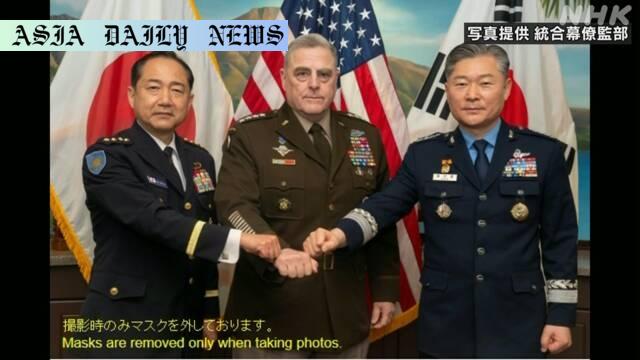Trilateral Cooperation – Defense chiefs of Japan, US, and South Korea unite to enhance security collaboration amid North Korea threats.
Trilateral Cooperation focus empowers Japan, US, S. Korea defense alignment.
North Korea’s advancing nuclear threats sparks joint military drills.
Japan and S.Korea reaffirm defense ties amidst intermittent political strains.

Introduction: Strengthening Trilateral Defense Cooperation
Leaders of the defense forces from Japan, the United States, and South Korea convened in Seoul on Friday to reinforce collaborative efforts in addressing escalating security concerns presented by North Korea. This meeting marks a significant development in trilateral cooperation against rising regional threats, especially with North Korea’s progress in nuclear and missile programs. For Japan, this was a notable diplomatic step, as it marked the first visit of the Self-Defense Forces’ top uniformed officer to South Korea in over a decade.
Addressing North Korea’s Advancing Threat
The discussions highlighted North Korea’s expanding nuclear capabilities and missile advancements. These developments have caused concern among regional and global powers. Japanese General Yoshida Yoshihide emphasized the importance of constructing a robust and reliable system for trilateral defense collaboration that sustains irrespective of individual countries’ internal political shifts. This message resonated with his counterparts, General Dan Caine of the United States and Admiral Kim Myung-soo of South Korea, who shared concerns about the unpredictable security scenario in Northeast Asia.
Joint Military Drills as a Symbol of Unity
While discussing strategic measures, the three defense chiefs recognized the urgency of coordinated actions. To underline their resolve, the three countries conducted joint military drills on the same day of the meeting, with notable participation from a US strategic bomber. Such actions not only send powerful signals to Pyongyang but also demonstrate the commitment to maintaining security and stability in the region, especially in the context of increasing nuclear threats and geopolitical tensions surrounding China and Russia.
Political Nuances and Future Cooperation
President Lee Jae-myung’s administration in South Korea, which took office just last month, has shown interest in seeking dialogue with North Korea. However, within the context of this trilateral cooperation, the focus remains firmly on countering threats through strategic alignment. The joint statement issued at the end of the meeting urged North Korea to abandon its nuclear ambitions and troops assisting Russia while reiterating the significance of trilateral cooperation to ensure broader regional stability and security.
Conclusion: A United Front for a Safer Future
This trilateral defense meeting marked a pivotal step in fostering collaboration among Japan, the United States, and South Korea amidst the growing challenges posed by North Korea. As the three nations move forward, maintaining a balance between military preparedness and diplomatic engagement will be key. The commitment to strengthening ties and conducting joint drills reflects a shared vision—ensuring peace and stability in a volatile region where security risks continue to evolve.



Commentary
Reflections on Unified Leadership Against North Korean Threats
The recent defense meeting in Seoul underscores the power of collaboration in the face of shared challenges. It is significant to see Japan, the United States, and South Korea reaffirm their commitment to countering North Korea’s growing military ambitions. This collective approach is not just pragmatic—it highlights the necessity of unity in a world where conflicts are often complex and multifaceted.
Balancing Military Preparedness and Diplomatic Dialogue
One aspect I find particularly interesting is South Korea’s dual approach, aiming for dialogue with North Korea while strengthening alignments with Japan and the US. Such a balanced stance showcases a pragmatic approach to diplomacy while ensuring readiness to tackle any unforeseen challenges. Though these nations come with varied historical contexts and political dynamics, their affirmation of trilateral cooperation is commendable in boosting regional security.
The Role of Symbolic Actions Like Military Drills
The joint military drills held during the defense chiefs’ meeting add a layer of action to the declarations made. These drills symbolize more than just preparedness; they send a definitive message of deterrence and unity against any aggressive actions North Korea might consider. Such visible demonstrations of strength not only strengthen alliances but also act as a firm reminder to adversaries of the unwavering commitment among allied nations.
Looking Ahead with Optimism and Caution
As Japan, the United States, and South Korea deepen their collaboration, we must remain cautiously optimistic about what the future holds. While military collaboration advances, it will also be critical for these nations to stay open to peace dialogues and explore ways to stabilize the region beyond just defense strategies. The road ahead is undoubtedly challenging, but as seen in their joint efforts, possibilities for a peaceful resolution remain achievable through unity and perseverance.